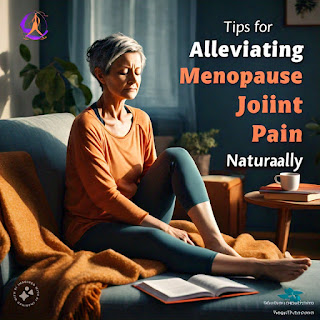Navigating Menopause Joint Pain: A Comprehensive Guide
Introduction to Menopause and Joint Pain: Understanding the Impact on
Women's Health
Menopause is a
natural phase in a woman’s life, marking the end of her reproductive years.
During this transition, many women experience a range of symptoms, one of which
is joint pain. This often-overlooked symptom can significantly impact daily
life, making it crucial to understand and manage effectively. In this guide, we
will delve into the science behind menopause joint pain, explore common
symptoms, discuss lifestyle changes, home remedies, medical treatments, and
share personal stories to empower women navigating this challenging period.
The Science Behind Menopause Joint Pain: Exploring Hormonal Changes and Their
Effects on Joints
Menopause joint
pain is primarily caused by hormonal fluctuations. As estrogen levels decline,
the body's inflammatory response can increase, leading to discomfort in the
joints. Estrogen plays a critical role in maintaining bone density and joint
health. Its reduction can cause increased joint stiffness, swelling, and pain.
Understanding these hormonal changes is essential for managing joint pain
effectively during menopause.
Common Symptoms and Signs of Menopause Joint Pain: Identifying and Managing
the Discomfort
Identifying menopause joint pain involves recognizing specific patterns and symptoms. Common indicators include:
- Morning Stiffness: Difficulty moving joints
after waking up.
- Swelling and Tenderness: Joints may feel
tender and swollen.
- Reduced Mobility: Decreased range of motion
and flexibility.
- Aching and Throbbing: Persistent pain in the
joints, often exacerbated by physical activity.
Managing these
symptoms involves a combination of lifestyle adjustments and medical interventions,
which we will explore further.
Lifestyle Changes and Home Remedies: Tips for Alleviating Menopause Joint
Pain Naturally
Adopting certain
lifestyle changes can significantly alleviate menopause joint pain. Here are
some tips:
- Regular Exercise: Engage in low-impact
activities like walking, swimming, and yoga to maintain joint mobility and
reduce stiffness.
- Healthy Diet: Incorporate anti-inflammatory
foods like fruits, vegetables, whole grains, and omega-3 fatty acids.
- Hydration: Drink plenty of water to keep
joints lubricated.
- Adequate Sleep: Ensure sufficient rest to help
the body repair and manage inflammation.
- Stress Management: Practices such as
meditation and mindfulness can help reduce stress-related inflammation.
Medical and Alternative Treatments: Options for Severe Menopause Joint Pain
For severe joint pain, medical and alternative treatments can provide relief:
- Hormone Replacement Therapy (HRT): This
treatment can help balance hormone levels and reduce joint pain.
- Nonsteroidal Anti-Inflammatory Drugs (NSAIDs):
Medications like ibuprofen can alleviate pain and inflammation.
- Physical Therapy: Professional guidance can
improve joint function and reduce discomfort.
- Alternative Therapies: Acupuncture and massage
therapy can provide pain relief and improve joint health.
- Supplements: Calcium, vitamin D, and
glucosamine supplements may support joint health.
The Role of Diet and Exercise: Promoting Joint Health During Menopause
Maintaining a
balanced diet and regular exercise routine is vital for joint health during
menopause:
- Diet: Focus on foods rich in antioxidants,
vitamins, and minerals. Include leafy greens, berries, nuts, and fish in
your diet.
- Exercise: Regular physical activity
strengthens muscles around the joints, enhances flexibility, and reduces
pain. Activities like pilates, tai chi, and strength training are highly
beneficial.
Personal Stories and Experiences: Real Accounts of Managing Menopause Joint
Pain
Hearing from
others who have navigated menopause joint pain can be incredibly reassuring and
informative. Here are a few personal stories:
- Sarah’s Story: "I found that integrating
yoga into my daily routine made a huge difference in managing my joint
pain. It not only improved my flexibility but also helped me stay calm and
centered."
- Emily’s Experience: "Switching to an
anti-inflammatory diet was a game-changer. Foods like turmeric and ginger
became staples in my meals, and I noticed a significant reduction in my
joint pain."
Use of Supplements: Enhancing Joint Health and Reducing Pain During
Menopause
Incorporating the right supplements can be an effective strategy for managing menopause joint pain. When chosen wisely, supplements can aid in maintaining joint health and alleviating discomfort. Here are some key supplements to consider:
- Calcium: Essential for maintaining strong
bones, calcium supplements can help counteract the reduced bone density
that commonly occurs during menopause.
- Vitamin D: This vitamin is crucial for calcium
absorption and bone health. Adequate vitamin D levels can help reduce the
risk of joint pain and osteoporosis.
- Omega-3 Fatty Acids: Found in fish oil
supplements, omega-3 fatty acids have powerful anti-inflammatory
properties that can alleviate joint pain and stiffness.
- Glucosamine and Chondroitin: These supplements
support cartilage health and may reduce joint pain and improve function
over time.
- Turmeric: Known for its anti-inflammatory
effects, turmeric supplements can be beneficial in managing joint pain
caused by inflammation.
- Collagen: This protein is a key component of
cartilage and taking collagen supplements may help improve joint integrity
and reduce pain.
Before starting
any supplement regimen, it is important to consult with a healthcare provider
to ensure compatibility with individual health needs and to avoid potential
interactions with other medications.
Conclusion: Empowering Women to Navigate Menopause Joint Pain with
Knowledge and Support
Menopause joint
pain can be challenging, but understanding its causes and knowing how to manage
it is empowering. By combining lifestyle changes, medical treatments, and
support from the community, women can navigate this phase with confidence and
comfort. Remember, you are not alone, and there are numerous resources and
strategies available to help you live a fulfilling life during menopause.
Call to Action: Encouraging Readers to Share
If you found this
guide helpful, please share it with others who may benefit. Let’s create a
supportive community where we can exchange tips and experiences. Have a tip or
story about managing menopause joint pain? Share it in the comments below!
Together, we can empower each other to thrive through menopause. And you are
the one who can help woman grow and live healthy life. Always kind to others
and spread awareness.


Post a Comment